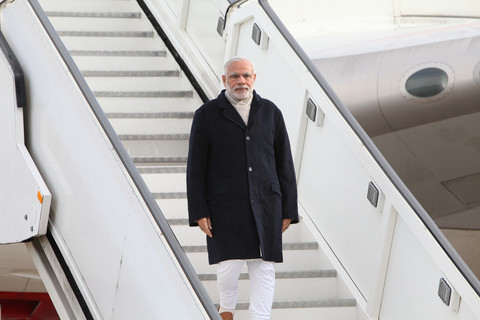[ad_1]

On Tuesday (12th January), the EU-India Human Rights dialogue will take place. Will EU leaders take a leap and stop keeping quiet about the deteriorating human rights situation in India?
The civic space in India has been squeezed tighter from all directions over the past couple of years.
Human rights defenders, religious minorities, and government critics have all been under pressure from several vaguely defined laws – including counter terrorism legislations – that are used to suppress them.
India’s recently amended Foreign Contribution Regulation Act (FCRA) is expected to become another nail in the coffin of advocacy-based human rights organisations in the country.
Most recently, Amnesty International had to close its operations in India over alleged violations of the Act.
Last year, the protests against Indian prime minister Narendra Modi and his controversial Citizenship Amendment Act (CAA) were the largest in a decade, and the crackdown was severe.
Resistance against the law has also helped bring different castes, religions and otherwise unconnected levels of society together.
The EU has a responsibility to support these forces and make it clear to the Indian government that it will not look the other way when human rights violations happen in the country.
In the forthcoming EU-India Human Rights Dialogue the EU has a perfect opportunity to do so.
Yet, the EU’s response to the shrinking space for civil society and the deteriorating human rights situation in India, on the other hand, has been disappointingly tame: two attempts of the European Parliament to pass resolutions on the Citizenship Amendment Act failed in January.
This was due to, amongst other things, diplomatic concerns over the India visit of the EU’s foreign policy chief Josep Borrell, and threats from India to cancel the EU-India summit, originally foreseen for March.
Because of the coronavirus, the summit was postponed and finally took place in July last year.
The next landmark is now the upcoming EU-India Human Rights dialogue. There seems to have been very little appetite in the EU institutions to take a firm public stance on India’s human rights situation prior to it.
Modi’s Hindu-nationalist agenda
In the report on his India trip, which took place one year ago, just after the protests against CAA started, Borrell did not say a single word about the protests.
Other EU high-level officials have also remained remarkably quiet. Obviously, EU diplomats wanted to give Modi the benefit of the doubt and not offend the biggest democracy of the world ahead of the summit.
But can the EU remain silent in the face of Modi’s Hindu-nationalist agenda, targeting the second-largest Muslim population in the world?
Detention centres are already being built across the country, and despite declarations by spokespeople of Modi’s ruling BJP party asserting that these are meant for “foreigners who are in India illegally”, there’s a high risk that only one group of people will end up there: Muslims.
With its actions, the Modi government not only violates India’s constitution (which clearly states equality of all persons before the law), but also the UN Declaration of Human Rights and the International Covenant on Civil and Political Rights, to which India is a signature state.
In line with its international commitments, the government should immediately agree to the following steps:
1. Respect international standards regarding the establishment of citizenship
2. Put an end to police violence and conduct independent and impartial investigation in all cases of use of force
3. Ensure freedom of speech for protesters including on the internet
4. Release the human rights defenders and protesters arrested
5. Cooperate with the UN Human Rights Council and the UN Special Rapporteur on Racism
6. Allow an immediate independent and impartial examination of human rights violations since the beginning of protests
But how can the EU put pressure on India to make this happen?
One instrument is the India Road Map 2025, which was agreed upon at the EU–India summit in July last year.
The focus of the thirteen-long page document lies with issues such as trade, and it attaches only marginal importance to human rights in its over 100 action points. It mentions the EU-India human rights dialogue only in passing, without any concrete or measurable objectives.
We do not have time to wait and see how the CAA will be implemented.
While visiting Kashmir has always been difficult for independent observers, the UN or official missions from the European Parliament, a group of MEPs from the extreme-right and populist parties were allowed to visit the Kashmir region in November 2019.
Sadly, it is not shocking that the Indian government allowed extreme-right politicians, close to the nationalist agenda of Modi and therefore willing to whitewash his anti-Muslim policies, to visit the region. Unsurprisingly, the deputies did not mention the human rights situation in the region, which is predominantly Muslim.
The EU mission in India was forced to officially distance itself from the trip – however, damage to the EU’s reputation may already have been done.
If the EU wants to remain credible when asking India to revise discriminatory laws, it must take steps to ensure some of its own representatives do not – even indirectly – undermine this attempt.
Some political groups in the European Parliament want to wait how the Indian Supreme Court will rule on the constitutionality of the Citizenship Amendment Act before taking a stand.
But considering the “lackadaisical attitude” the court has taken in the past towards human rights violations in Kashmir, it may not be wise to hope for too much in this respect. What is more, amendments to the Foreign Contribution Regulation Act are already being fully implemented.
These discriminatory laws must now be called out by the EU – before their provisions cause irreversible damage.
[ad_2]
Source link